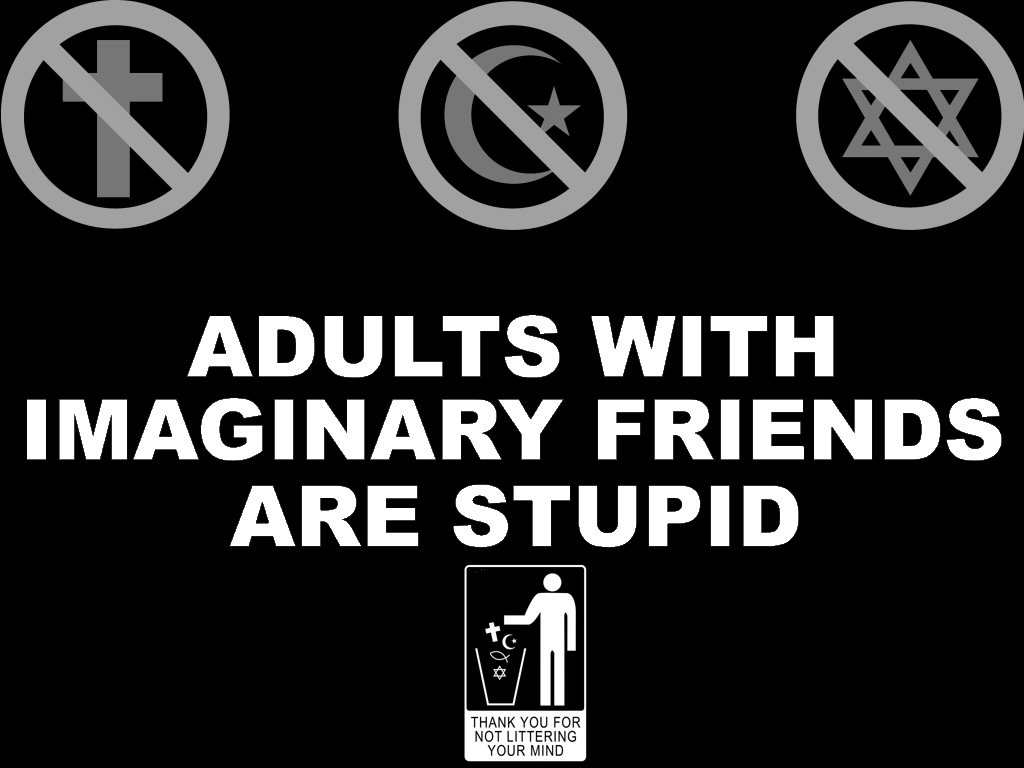
First of all, I wanted to copy/paste this article in because it does seem to succinctly sum up so many things for me. I also wanted to post in this forum because for once it seems us atheists are the most vocal here. I am rather surprised at the total lack of responses many of the threads I have posted here have got.
10 myths—and 10 not-myths—About Atheism
By Sam Harris
December 24, 2006
The Los Angeles Times
SEVERAL POLLS indicate that the term “atheism” has acquired such an extraordinary stigma in the United States that being an atheist is now a perfect impediment to a career in politics (in a way that being black, Muslim or homosexual is not). According to a recent Newsweek poll, only 37% of Americans would vote for an otherwise qualified atheist for president.
Atheists are often imagined to be intolerant, immoral, depressed, blind to the beauty of nature and dogmatically closed to evidence of the supernatural.
Even John Locke, one of the great patriarchs of the Enlightenment, believed that atheism was “not at all to be tolerated” because, he said, “promises, covenants and oaths, which are the bonds of human societies, can have no hold upon an atheist.”
That was more than 300 years ago. But in the United States today, little seems to have changed. A remarkable 87% of the population claims “never to doubt” the existence of God; fewer than 10% identify themselves as atheists — and their reputation appears to be deteriorating.
Given that we know that atheists are often among the most intelligent and scientifically literate people in any society, it seems important to deflate the myths that prevent them from playing a larger role in our national discourse.
1) Atheists believe that life is meaningless.
On the contrary, religious people often worry that life is meaningless and imagine that it can only be redeemed by the promise of eternal happiness beyond the grave. Atheists tend to be quite sure that life is precious. Life is imbued with meaning by being really and fully lived. Our relationships with those we love are meaningful now; they need not last forever to be made so. Atheists tend to find this fear of meaninglessness … well … meaningless.
2) Atheism is responsible for the greatest crimes in human history.
People of faith often claim that the crimes of Hitler, Stalin, Mao and Pol Pot were the inevitable product of unbelief. The problem with fascism and communism, however, is not that they are too critical of religion; the problem is that they are too much like religions. Such regimes are dogmatic to the core and generally give rise to personality cults that are indistinguishable from cults of religious hero worship. Auschwitz, the gulag and the killing fields were not examples of what happens when human beings reject religious dogma; they are examples of political, racial and nationalistic dogma run amok. There is no society in human history that ever suffered because its people became too reasonable.
3) Atheism is dogmatic.
Jews, Christians and Muslims claim that their scriptures are so prescient of humanity’s needs that they could only have been written under the direction of an omniscient deity. An atheist is simply a person who has considered this claim, read the books and found the claim to be ridiculous. One doesn’t have to take anything on faith, or be otherwise dogmatic, to reject unjustified religious beliefs. As the historian Stephen Henry Roberts (1901-71) once said: “I contend that we are both atheists. I just believe in one fewer god than you do. When you understand why you dismiss all the other possible gods, you will understand why I dismiss yours.”
4) Atheists think everything in the universe arose by chance.
No one knows why the universe came into being. In fact, it is not entirely clear that we can coherently speak about the “beginning” or “creation” of the universe at all, as these ideas invoke the concept of time, and here we are talking about the origin of space-time itself.
The notion that atheists believe that everything was created by chance is also regularly thrown up as a criticism of Darwinian evolution. As Richard Dawkins explains in his marvelous book, “The God Delusion,” this represents an utter misunderstanding of evolutionary theory. Although we don’t know precisely how the Earth’s early chemistry begat biology, we know that the diversity and complexity we see in the living world is not a product of mere chance. Evolution is a combination of chance mutation and natural selection. Darwin arrived at the phrase “natural selection” by analogy to the “artificial selection” performed by breeders of livestock. In both cases, selection exerts a highly non-random effect on the development of any species.
5) Atheism has no connection to science.
Although it is possible to be a scientist and still believe in God — as some scientists seem to manage it — there is no question that an engagement with scientific thinking tends to erode, rather than support, religious faith. Taking the U.S. population as an example: Most polls show that about 90% of the general public believes in a personal God; yet 93% of the members of the National Academy of Sciences do not. This suggests that there are few modes of thinking less congenial to religious faith than science is.
6) Atheists are arrogant.
When scientists don’t know something — like why the universe came into being or how the first self-replicating molecules formed — they admit it. Pretending to know things one doesn’t know is a profound liability in science. And yet it is the life-blood of faith-based religion. One of the monumental ironies of religious discourse can be found in the frequency with which people of faith praise themselves for their humility, while claiming to know facts about cosmology, chemistry and biology that no scientist knows. When considering questions about the nature of the cosmos and our place within it, atheists tend to draw their opinions from science. This isn’t arrogance; it is intellectual honesty.
7) Atheists are closed to spiritual experience.
There is nothing that prevents an atheist from experiencing love, ecstasy, rapture and awe; atheists can value these experiences and seek them regularly. What atheists don’t tend to do is make unjustified (and unjustifiable) claims about the nature of reality on the basis of such experiences. There is no question that some Christians have transformed their lives for the better by reading the Bible and praying to Jesus. What does this prove? It proves that certain disciplines of attention and codes of conduct can have a profound effect upon the human mind. Do the positive experiences of Christians suggest that Jesus is the sole savior of humanity? Not even remotely — because Hindus, Buddhists, Muslims and even atheists regularly have similar experiences.
There is, in fact, not a Christian on this Earth who can be certain that Jesus even wore a beard, much less that he was born of a virgin or rose from the dead. These are just not the sort of claims that spiritual experience can authenticate.
8) Atheists believe that there is nothing beyond human life and human understanding.
Atheists are free to admit the limits of human understanding in a way that religious people are not. It is obvious that we do not fully understand the universe; but it is even more obvious that neither the Bible nor the Koran reflects our best understanding of it. We do not know whether there is complex life elsewhere in the cosmos, but there might be. If there is, such beings could have developed an understanding of nature’s laws that vastly exceeds our own. Atheists can freely entertain such possibilities. They also can admit that if brilliant extraterrestrials exist, the contents of the Bible and the Koran will be even less impressive to them than they are to human atheists.
From the atheist point of view, the world’s religions utterly trivialize the real beauty and immensity of the universe. One doesn’t have to accept anything on insufficient evidence to make such an observation.
9) Atheists ignore the fact that religion is extremely beneficial to society.
Those who emphasize the good effects of religion never seem to realize that such effects fail to demonstrate the truth of any religious doctrine. This is why we have terms such as “wishful thinking” and “self-deception.” There is a profound distinction between a consoling delusion and the truth.
In any case, the good effects of religion can surely be disputed. In most cases, it seems that religion gives people bad reasons to behave well, when good reasons are actually available. Ask yourself, which is more moral, helping the poor out of concern for their suffering, or doing so because you think the creator of the universe wants you to do it, will reward you for doing it or will punish you for not doing it?
10) Atheism provides no basis for morality.
If a person doesn’t already understand that cruelty is wrong, he won’t discover this by reading the Bible or the Koran — as these books are bursting with celebrations of cruelty, both human and divine. We do not get our morality from religion. We decide what is good in our good books by recourse to moral intuitions that are (at some level) hard-wired in us and that have been refined by thousands of years of thinking about the causes and possibilities of human happiness.
We have made considerable moral progress over the years, and we didn’t make this progress by reading the Bible or the Koran more closely. Both books condone the practice of slavery — and yet every civilized human being now recognizes that slavery is an abomination. Whatever is good in scripture — like the golden rule — can be valued for its ethical wisdom without our believing that it was handed down to us by the creator of the universe.










